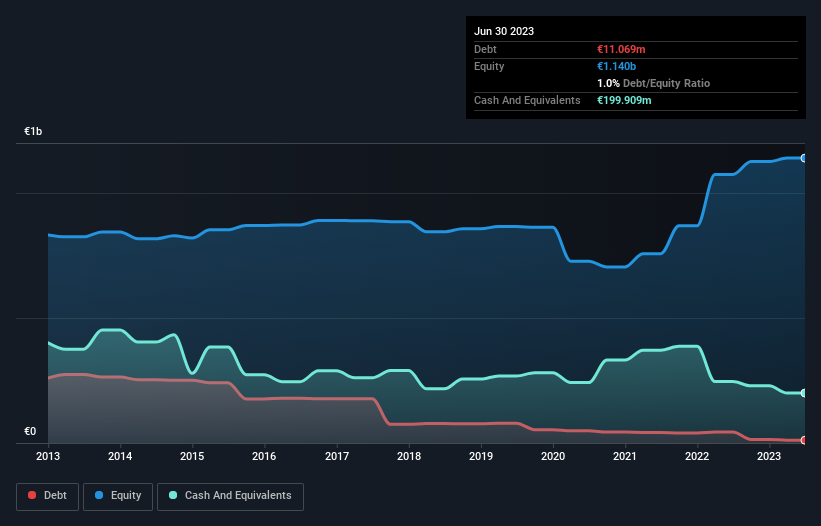Howard Marks put it nicely when he said that, rather than worrying about share price volatility, 'The possibility of permanent loss is the risk I worry about... and every practical investor I know worries about.' It's only natural to consider a company's balance sheet when you examine how risky it is, since debt is often involved when a business collapses. Importantly, KSB SE & Co. KGaA (ETR:KSB) does carry debt. But should shareholders be worried about its use of debt?
When Is Debt Dangerous?
Debt is a tool to help businesses grow, but if a business is incapable of paying off its lenders, then it exists at their mercy. If things get really bad, the lenders can take control of the business. However, a more common (but still painful) scenario is that it has to raise new equity capital at a low price, thus permanently diluting shareholders. Of course, plenty of companies use debt to fund growth, without any negative consequences. When we think about a company's use of debt, we first look at cash and debt together.
Check out our latest analysis for KSB SE KGaA
How Much Debt Does KSB SE KGaA Carry?
As you can see below, KSB SE KGaA had €11.1m of debt at June 2023, down from €43.6m a year prior. But on the other hand it also has €199.9m in cash, leading to a €188.8m net cash position.

A Look At KSB SE KGaA's Liabilities
The latest balance sheet data shows that KSB SE KGaA had liabilities of €895.1m due within a year, and liabilities of €511.8m falling due after that. Offsetting these obligations, it had cash of €199.9m as well as receivables valued at €800.3m due within 12 months. So its liabilities total €406.7m more than the combination of its cash and short-term receivables.
While this might seem like a lot, it is not so bad since KSB SE KGaA has a market capitalization of €1.02b, and so it could probably strengthen its balance sheet by raising capital if it needed to. But it's clear that we should definitely closely examine whether it can manage its debt without dilution. Despite its noteworthy liabilities, KSB SE KGaA boasts net cash, so it's fair to say it does not have a heavy debt load!
On top of that, KSB SE KGaA grew its EBIT by 58% over the last twelve months, and that growth will make it easier to handle its debt. There's no doubt that we learn most about debt from the balance sheet. But it is future earnings, more than anything, that will determine KSB SE KGaA's ability to maintain a healthy balance sheet going forward. So if you want to see what the professionals think, you might find this free report on analyst profit forecasts to be interesting.
Finally, while the tax-man may adore accounting profits, lenders only accept cold hard cash. While KSB SE KGaA has net cash on its balance sheet, it's still worth taking a look at its ability to convert earnings before interest and tax (EBIT) to free cash flow, to help us understand how quickly it is building (or eroding) that cash balance. Over the last three years, KSB SE KGaA reported free cash flow worth 18% of its EBIT, which is really quite low. That limp level of cash conversion undermines its ability to manage and pay down debt.
Summing Up
While KSB SE KGaA does have more liabilities than liquid assets, it also has net cash of €188.8m. And it impressed us with its EBIT growth of 58% over the last year. So we are not troubled with KSB SE KGaA's debt use. When analysing debt levels, the balance sheet is the obvious place to start. However, not all investment risk resides within the balance sheet - far from it. For example, we've discovered 1 warning sign for KSB SE KGaA that you should be aware of before investing here.
If, after all that, you're more interested in a fast growing company with a rock-solid balance sheet, then check out our list of net cash growth stocks without delay.
Valuation is complex, but we're here to simplify it.
Discover if KSB SE KGaA might be undervalued or overvalued with our detailed analysis, featuring fair value estimates, potential risks, dividends, insider trades, and its financial condition.
Access Free AnalysisHave feedback on this article? Concerned about the content? Get in touch with us directly. Alternatively, email editorial-team (at) simplywallst.com.
This article by Simply Wall St is general in nature. We provide commentary based on historical data and analyst forecasts only using an unbiased methodology and our articles are not intended to be financial advice. It does not constitute a recommendation to buy or sell any stock, and does not take account of your objectives, or your financial situation. We aim to bring you long-term focused analysis driven by fundamental data. Note that our analysis may not factor in the latest price-sensitive company announcements or qualitative material. Simply Wall St has no position in any stocks mentioned.
About XTRA:KSB
KSB SE KGaA
Manufactures and supplies pumps, valves, and related services worldwide.
Flawless balance sheet, undervalued and pays a dividend.
Similar Companies
Market Insights
Community Narratives




